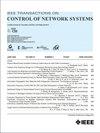Dynamic-Memory Event-Based Adaptive Sliding-Mode Control for Networked Nonlinear Implicit Hybrid Systems Under Random Spoofing Attacks and Data-Buffer- Aided Mechanism
IF 4
3区 计算机科学
Q2 AUTOMATION & CONTROL SYSTEMS
引用次数: 0
Abstract
In this article, we investigates the issue of dynamic-memory event-based adaptive sliding-mode control for fuzzy-model-based nonlinear implicit Markov jump systems. The communication networks are deemed to be invaded by spoofing attacks in a probabilistic manner, where normally transmitted data may be replaced. Depending on the data-buffer-aided mechanism, a novel dynamic-memory event-triggered protocol is proposed to modulate the transmission frequency by drawing into historically released packets and two auxiliary internal dynamic variables. Then, a suitable event-triggered adaptive sliding-mode control strategy is developed to actualize the reachability of the specified integral sliding surface, which is capable of diminishing the impacts of model uncertainties. Stochastic admissibility and strict dissipativity conditions of closed-loop fuzzy implicit Markov jump systems are derived under the framework of linear matrix inequalities. Finally, a networked truck–trailer reversing system is exploited to verify the validity of developed strategies.随机欺骗攻击和数据缓冲辅助机制下网络非线性隐式混合系统的基于动态记忆事件的自适应滑模控制
本文章由计算机程序翻译,如有差异,请以英文原文为准。
求助全文
约1分钟内获得全文
求助全文
来源期刊

IEEE Transactions on Control of Network Systems
Mathematics-Control and Optimization
CiteScore
7.80
自引率
7.10%
发文量
169
期刊介绍:
The IEEE Transactions on Control of Network Systems is committed to the timely publication of high-impact papers at the intersection of control systems and network science. In particular, the journal addresses research on the analysis, design and implementation of networked control systems, as well as control over networks. Relevant work includes the full spectrum from basic research on control systems to the design of engineering solutions for automatic control of, and over, networks. The topics covered by this journal include: Coordinated control and estimation over networks, Control and computation over sensor networks, Control under communication constraints, Control and performance analysis issues that arise in the dynamics of networks used in application areas such as communications, computers, transportation, manufacturing, Web ranking and aggregation, social networks, biology, power systems, economics, Synchronization of activities across a controlled network, Stability analysis of controlled networks, Analysis of networks as hybrid dynamical systems.
 求助内容:
求助内容: 应助结果提醒方式:
应助结果提醒方式:


